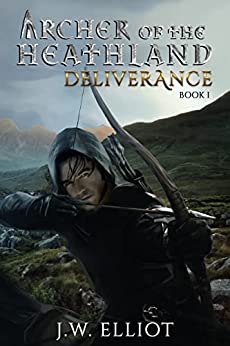Interview with J.W. Elliot
Author of Deliverance (Archer of the Heathland, Book 1)
James writes fantasy, science fiction, and historical fiction. He is the author of the award-winning series Archers of the Heathland and The Ark Project. The Clone Paradox (Book 1 of the Ark Project series) won the New England Book Festival in the science fiction category in 2021 and was an Award-Winning Finalist in Science Fiction: General category of the 2021 American Fiction Awards.
James is a professional historian whose published works include two histories of the Inquisition, a documentary history of Columbus's first voyage, an award-winning transcription of a colonial-era account book from Weymouth, Massachusetts, and a global history of piracy.
He loves to paddle his canoe, shoot his handmade longbows in the woods, make knives, study martial arts, and generally enjoys challenging himself. When not teaching or writing about the real past, he is imagining worlds and histories that might have been, should have been, or may yet be.
Buy this book
What inspirations did you have that led you to the path of the writer? Did you have an author you looked up to growing up or a storyteller in the family or community?
- Some of my earliest memories are of my mother reading to me. We had a subscription to National Geographic, which I devoured, and the Reader’s Digest, as well as a bookshelf filled with encyclopedias. So I have always loved stories and knowledge. But I think the real catalyst in me becoming a writer occurred when I was ten years old, and my family moved from Idaho to Oklahoma. It was a very lonely time for me, and I found solace and friendship in the characters I met in the books and comics I read. That was where I discovered J.R.R Tolkien, Ursula K. LeGuin, and Katherine Kurtz. That experience inspired me to take a creative writing course in high school, and I have been writing fiction ever since.
What are some of the moments that you’ve had in your writing journey that have encouraged you to keep going along with the craft? Conversely, what challenges have you had that might have been close to chasing you off the path?
- I dabbled in fiction writing for many years while I went to graduate school and started building my academic career. I often worked on my stories to wind down and relax at the end of the day. Eventually, I started reading them to my kids at bedtime, and their enthusiasm kept me writing. I knew I had to have something new for them the next day. My new series, Heirs of Anarwyn, was created in that give-and-take as I read and the kids critiqued.
The biggest challenge is the time and discipline it takes to produce good work over and over again. Writing is mentally and emotional exhausting. If I didn’t find so much pleasure in writing these stories, I don’t think I could keep doing it.
I also spent years getting rejections and that can be quite discouraging. Then when I did get work published and the reviews came in, there were always those trolls who felt it was their responsibility to poke writers in the eye. I respect honest reviews. Personally, I read them and see if they have a legitimate point. If they do, I try to fix the problem. Most of the time, however, trolls criticize books for being something they never set out to be or they nitpick at things that are nothing more than personal preference and have nothing to do with the quality of the book. Those kinds of reviews can hurt, but I have long since abandoned any notion that I should hold out for universal popularity. I can’t please everyone. So, I write stories that I want to read and hope others will find them as fun and engaging as I do.
A great deal of fantasy writers have their favorite authors or fandoms, but you seem to appreciate it all. Is there a certain fantasy that you lean on if you ever need to decompress or reel yourself back out of any of your own works?
- I love all great stories. I really don’t care what the genre is. But my “go-to” fantasy books—the ones I return to over and over again—are, of course, J.R.R. Tolkien’s Lord of the Rings and Ursula K. LeGuin’s Earth Sea Trilogy. I think these stories have a timeless quality to them that spoke to me as a child and still speaks to me as a more jaded adult. I devoured the Terry Brooks’s Shannara series. Somehow, I missed reading Frank Herbert’s Dune while I grew up, but I just read the first book and loved it. So now, I’m getting into that entire series. I really enjoy Brandon Sanderson—especially the Mistborn trilogy and The Reckoners series. I find the Harry Potter series enjoyable, and I’m about halfway through Robert Jordan’s The Wheel of Time.
Can you tell us a little about the locations in your book?
- The Archer of the Heathland series is set in the fantasy world of Frei-Ock Islands and the Southlands. Frei-Ock Mor is the large island with two mountain rangers and broad open heathland. The Southlands are larger and more diverse with denser and wealthier populations. I employ a Braudelian technique of having the land inspire the kinds of people and cultures who inhabit it. The landscape is a character with who the other characters must interact.
What advice would you give to aspiring authors?
- Years ago, after receiving a series of “positive” rejections from editors and presses, I contacted David Farland, a New York Times Best Selling author. (He passed away recently, which is a huge loss to the fantasy community and the writing community.) Despite all the demands on his time, he took a moment to write a very encouraging email in which the most important phrase was “study the craft.” This is what every writer, fledgling or well-seasoned, needs to be doing. Those three words changed my life and helped me write some award-winning books and allowed me to make money pursuing a hobby I find so fulfilling.
What's your writing process?
- I believe that writing fiction is a craft that requires study, planning, and analysis. I have a careful process I follow from the initial story idea all the way to a detailed scene map that outlines the novel in a way that is structurally sound. I draft the novel and then go over it a couple of times before I do a structural edit and then a scene by scene edit. When the story is in good shape, I send it to my editor, revise as needed, send it out to beta readers, and revise again. Then I do a a careful wordsmithing edit and a dialogue edit before I give it another read and send it back to my editor. She goes over it, then I go over it again this time reading it out loud. Once that's done. It's reading to be sent for typesetting and copy editing. The process is long and complicated, but I believe in giving my readers the best book I can possibly produce.
Likewise, another trait that you have in common with your main character in the Archer series is your hobby of crafting and shooting longbows. How did you come about that activity, and what is your favorite part about it?
- My dad gave me a fiberglass bow when I was about eight or nine years old. I’m afraid I did some really dangerous things with that bow that I’m not going to talk about here for fear of giving someone bad ideas. I took up bow hunting as a teenager when I transitioned to compound bows. Graduate school left me little time to pursue archery, so I set it aside until I graduated. When I went back to my compound, I found I wasn’t enjoying it as much as I had, and I almost gave up archery altogether. About that time, I served a week at my daughter’s summer camp as the archery instructor where I met a man shooting a 42 lb. recurve. He let me shoot it, and I discovered what I had been missing. Perhaps it’s the historian in me, but I find the simple bow and string fascinating, and that is where my passion is. I sold all my compounds, purchased a Fred Bear recurve, and started relearning the joy of shooting again. I wanted to try a longbow, but all the ones I could find at the time were just too expensive to justify purchasing. So I set out to learn how to make my own. It took me a couple of years to get the process down, and I published a book on how to do it that I hope shortens the learning curve for others. I am currently reverse-engineering a Turkish bow I have. My first attempt came close but was not good enough. I’m hoping to make a second attempt this summer. Still, it is very satisfying to go into the woods using equipment I made.
The newest Archer book ends in a way that is smooth enough to move away from if you needed to, but it also leaves the door open enough to return. What are your plans for Brion now? Are you sticking by his side, or are you looking to focus on another hero? And if you are choosing a new protagonist to breathe life into, are you staying in the same world you’ve built?
- For now, I am going to let Brion rest. His character had a full arc with lots of growth, and he needs some time to settle into his new role as duke. But I have already started work on a spin-off series with Mara and Jack (see Archer of the Heathland books 4-7) that I think will be three books. Then I have at least one more spin-off I want to do that focuses on crossbows rather than longbows with a couple of the characters introduced in book 7. These will all be set in the Heathland, and they will all have some familiar characters in them.
How have readers responded to'Deliverance?
- Deliverance has 615 reviews. 93% of which are 4 and 5 star reviews. The entire series is in the bestselling category on Amazon and some of the books have won literary prizes.
Where next? What are you working on now?
- Right now, I working on the second and third books in the Heirs of Anarwyn series. There will be two more in that series and then I will return to the heathland a spin off series.
Synopsis
Brion never meant to start a war. But when they murdered his parents and enslaved his sister and his sweetheart, they left him no choice.
Brion of Wexford is the son of a crippled trapper living a quiet life on the edge of the vast and unruly heathland. But when Salassani raiders destroy his world, he must venture into the heathland to attempt the impossible task of finding the girls, rescuing them, and conveying them safely home across hundreds of miles of enemy territory.
Now Brion finds himself pursued by men bent on his destruction, deprived of his protectors, and haunted by the knowledge that his murdered father has hidden a dark secret that could reshape Brion’s entire identity. Brion must find a way to stay alive long enough to get the girls safely home.
This is an adventure series perfect for fans of John Flanagan’s Ranger's Apprentice, J.R.R. Tolkien’s Lord of the Rings, T.H. White’s The Sword in the Stone, Christopher Paolini’s Eragon series, and George R. R. Martin’s Game of Thrones / A Song of Ice and Fire series.

